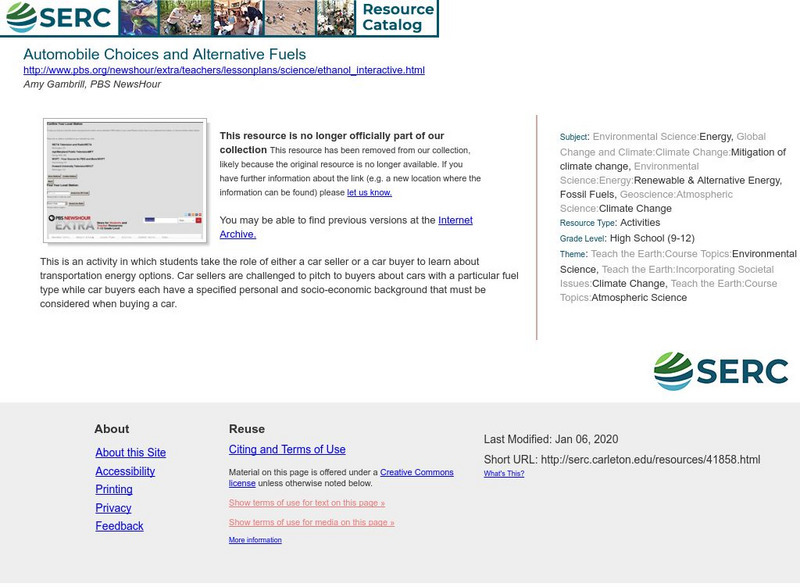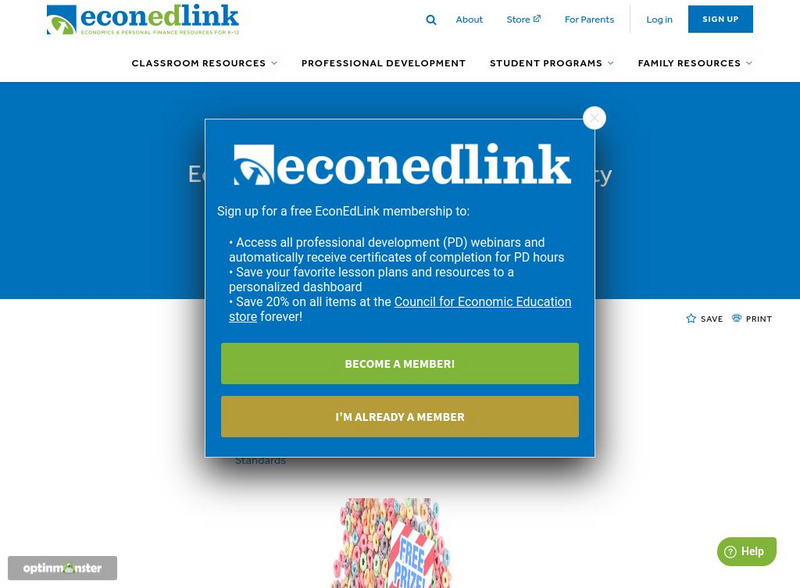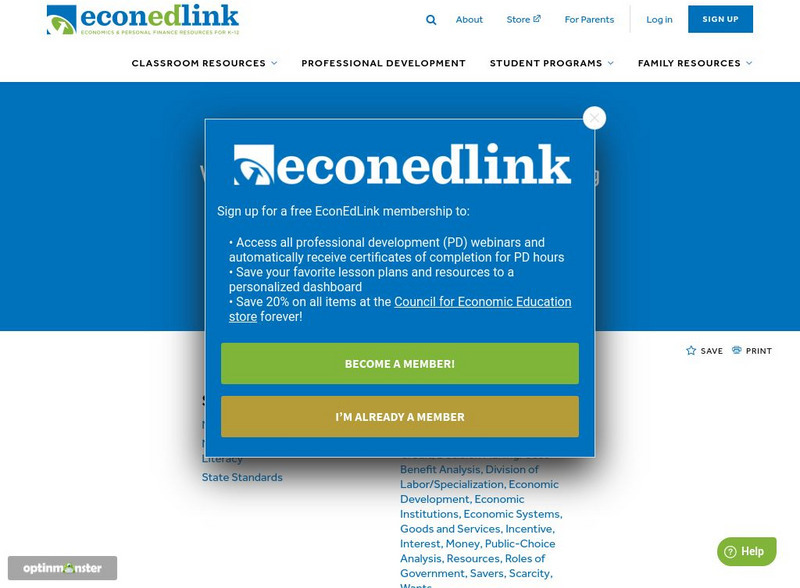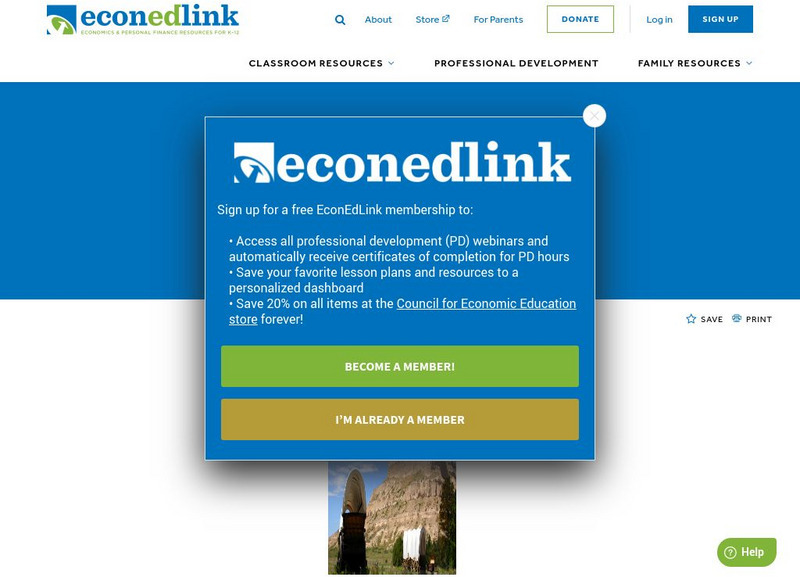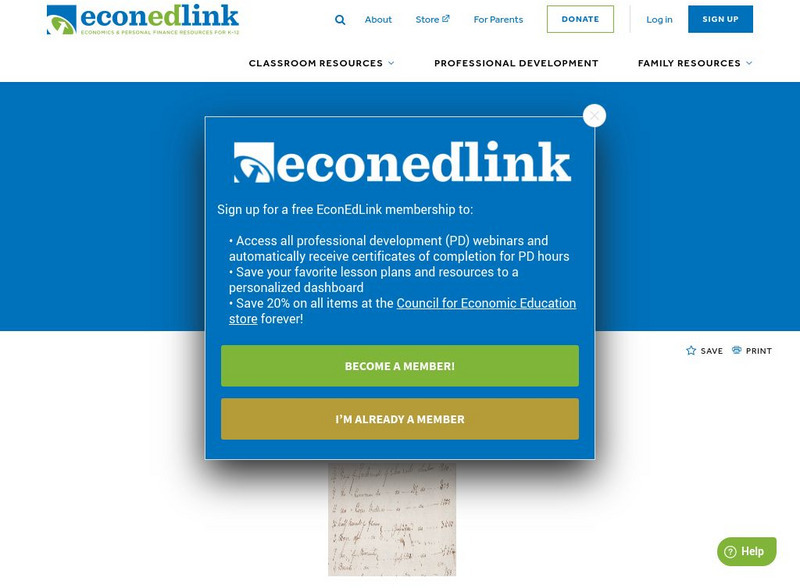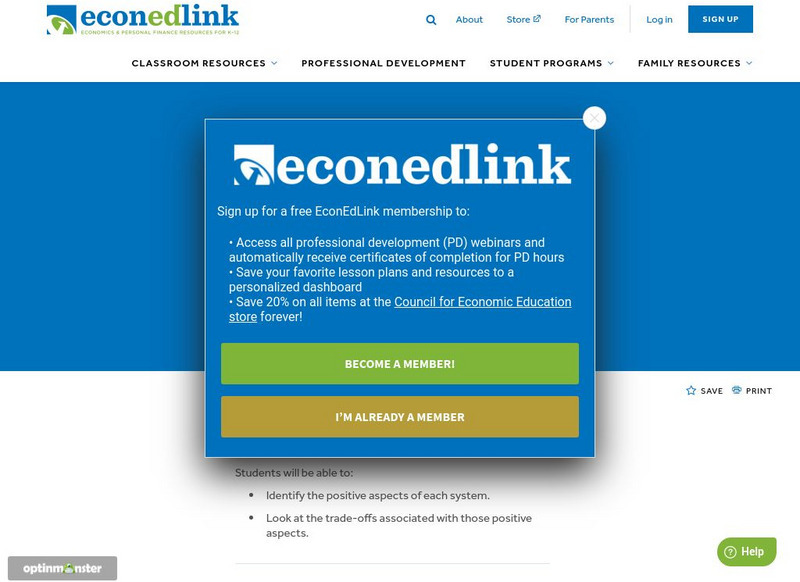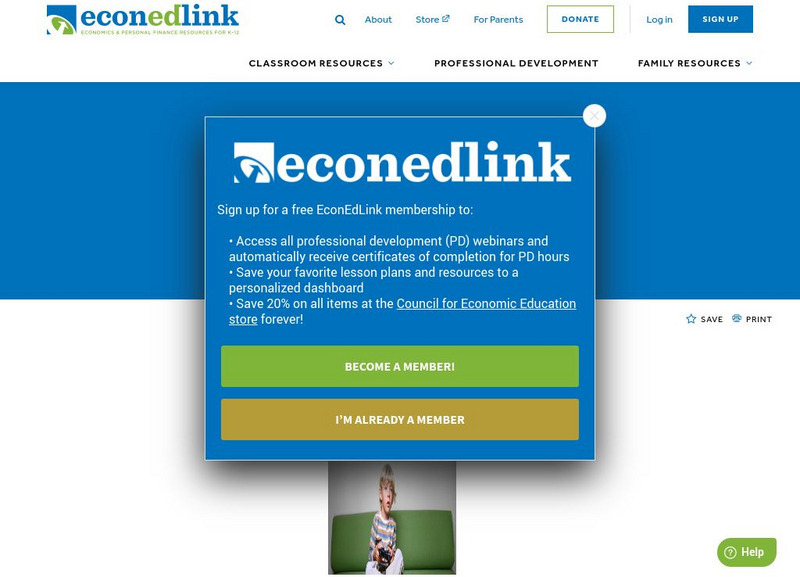Hi, what do you want to do?
Science Education Resource Center at Carleton College
Serc: Automobile Choices and Alternative Fuels
This is an activity in which students take the role of either a car seller or a car buyer to learn about transportation energy options. Car sellers are challenged to pitch to buyers about cars with a particular fuel type while car buyers...
Council for Economic Education
Econ Ed Link: Economic Incentives in Our Community
Students will identify positive and negative economic incentives used in their communities to encourage people to make CHOICES beneficial to the community. Students will recognize that not all incentives convince all people since people...
Council for Economic Education
Econ Ed Link: Here's Your Chance to Make Millions in the Stock Market (Part 1)
In this lesson, students will learn about the impact that efficient markets have on attempting to correctly time the stock market, as well as how investing in stocks should have long-term investment goals. Part I begins by having...
Council for Economic Education
Econ Ed Link: Dynamic Decision Making
Learners will be introduced to the PACED Model and learn to use the parts of the model-- Problem, Alternatives, Criteria, and Evaluation- in solving problems and making decisions. They will practice using the model in decisions about...
Council for Economic Education
Econ Ed Link: Work, Earnings and Economics: Using Lyddie by Katherine Paterson
In reading and discussing Lyddie, by Katherine Paterson, young scholars examine basic economic concepts and explore the growth of labor unions and the role of government in a market economy.
Council for Economic Education
Econ Ed Link: If I Ran the Zoo Economics and Literature
Welcome to the Zoo! In this two-day lesson you will use Dr. Seuss' If I Ran The Zoo book to introduce the economic concepts to your learners. You will also get the chance to use actual zoo criteria to help a zoo "choose" new animals.
Council for Economic Education
Econ Ed Link: Economic Spotter: Resources During Wwii
This is a lesson that deals with scarcity during WWII. Natural, human, and capital resources are discussed.
Council for Economic Education
Econ Ed Link: Off to Interactive Island
This site is a instructional activity that teaches students about scarcity and choice. Students participate in a simulation where they are asked to make choices about what they want to take with them in order to survive.
Council for Economic Education
Econ Ed Link: The Mystery of the Voters Who Don't Vote
This lesson plan from the Council for Economic Education for students, grades 9-12, examines the question of why many Americans don't vote. It interestingly ties the answer to some economic terms such as choice, cost/benefit analysis,...
Council for Economic Education
Econ Ed Link: Every Penny Counts
Lesson that helps students understand that people must make choices about the goods and services they purchase. Students recognize the prices indicate what people pay for goods and services, learn to compare prices, and understand that...
Council for Economic Education
Econ Ed Link: Economic & Political Freedom (Grades 9 12)
In this lesson, students analyze the concepts of economic freedom and political freedom, identify ways to measure them and explore the relation between measures of well-being and between measures of freedom.
Other
Foundation for Teaching Economics: Lesson 2: Opportunity Cost and Incentives
This lesson covers the National Content Standard 2: Marginal Decision Making. It provides key terms and concepts around scarcity forces, changing opportunity costs which affect incentives and choices. It includes links to a teacher's...
Council for Economic Education
Econ Ed Link: The Choice Is Us: Monopolies
This instructional activity introduces the concept of monopoly. It calls upon students to consider how monopoly power might affect the quality and price of goods and services offered to consumers. In light of what they learn about the...
Council for Economic Education
Econ Ed Link: Hawaiian Economics: From the Mountains to the Sea
Ancient Hawaii was ruled by chiefs, who were responsible for the well-being of their people and for managing the islands' resources. The chiefs divided the islands into land districts shaped like pie slices called Ahupua'a (ah-who-...
Council for Economic Education
Econ Ed Link: Scarcity With the Lewis and Clark Expedition (Teacher Version)
The Lewis and Clark expedition was filled with scarcity issues. They made life and death choices based on scarcity. For this lesson, you will travel back to the early 1800's in a time machine and travel with Lewis and Clark. See if you...
Council for Economic Education
Econ Ed Link: The Euro Makes Its Debut
On Jan. 1, 1999 11 European countries united in the European Monetary Union. The new single currency bloc includes almost 300 million consumers and creates the second-largest economy in the world. How will this new union affect the...
Council for Economic Education
Econ Ed Link: Classroom Cash Incentive Plan
Learn more about the economy through this informative lesson. "In this lesson, you will learn how the incentive program affects the personal choices you make in class. You will also analyze how economic incentives can affect behavior."
Council for Economic Education
Econ Ed Link: Clipping Coupons
Explore this website to find out how and why consumers make choices on what products to buy. Learn how producers entice consumers into buying their products. This is a very informative lesson plan.
Council for Economic Education
Econ Ed Link: I Can Dream Anything!
Go to this site for fun activities and a great lesson on personal choices and specialization. This lesson provides the primary teacher with an excellent opportunity to incorporate a character education lesson on self-esteem, while...
Council for Economic Education
Econ Ed Link: The Price We Pay for Health: Us and Canada
Students will review the health systems of United States and Canada. They will identify the positive aspects of each system. They will look at the trade-offs associated with those positive aspects. In Canada, everyone has health care,...
Council for Economic Education
Econ Ed Link: Off to Interactive Island
This activity provides a fun way to explore concept of economic decision making. In the instructional activity, learners are given a limited number of "tokens" and asked to exchange those tokens for goods in preparation for pioneering in...
Council for Economic Education
Econ Ed Link: Show Me the Money!
Students will investigate unforeseen costs of car loans and/or house loans. They will then evaluate the economics of decision making, the ramifications of their choices, and options available to them. Students will compute costs and...
Council for Economic Education
Econ Ed Link: You Decide!
Think about a difficult decision you have had to make. After you decided did it work out? Why or why not? Why do you think decisions and choices are hard to make? We make personal decisions and we make decisions as groups. There is a...
Council for Economic Education
Econ Ed Link: What Are Incentives?
Young scholars will understand that incentives are used to encourage them to make good choices. After identifying incentives offered at home and in school, the students will distinguish between positive and negative incentives.





